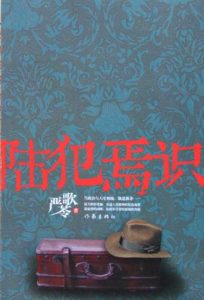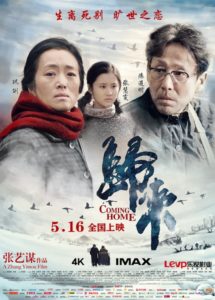Coming Home
归来
China, 2014, colour, 2.35:1, 108 mins.
Director: Zhang Yimou 张艺谋.
Rating: 9/10.
Director Zhang Yimou rediscovers his creative mojo with a deeply affecting period love story.
A city in northeast China, c. 1973. Feng Wanyu (Gong Li) is officially informed by a Party representative (Guo Tao) that her husband Lu Yanshi (Chen Daoming) – who was branded a Rightist and sent to a labour camp in Xining, Qinghai province, in the late 1950s – has escaped. Feng Wanyu and her daughter Dandan (Zhang Huiwen), a gifted ballet student, are reminded that Lu Yanshi is an enemy of the people, and Dandan affirms her loyalty to the Party. One rainy night, Lu Yanshi arrives in town and tries to make contact with Feng Wanyu at the family flat, which is under surveillance; he is unsuccessful, but on the way out he bumps into Dandan as she returns home. Lu Yanshi leaves a message with her for Feng Wanyu to meet him at the train station at 8 a.m. the next day, and also leaves the same message under the door of the flat. Already informed that her father’s history could jeopardise her chances of getting the lead role in a production of the ballet Red Detachment of Women 红色娘子军, Dandan betrays her father, who is arrested next morning. Three years later the Cultural Revolution ends. In 1978 the now-rehabilitated Lu Yanshi returns home and is met by Dandan, who has given up dance and now works in a textile factory, in whose dormitory she also lives. Lu Yanshi is keen to be reunited with Feng Wanyu but finds she has psychogenic amnesia and doesn’t recognise him. A local Party cadre (Yan Ni) finds him a room nearby in which to stay, and he and Dandan start the long process of trying to jog Feng Wanyu’s memory.
REVIEW
Two-and-a-half years after the misstep of The Flowers of War 金陵十三钗 (2011), Mainland director Zhang Yimou 张艺谋 triumphantly rediscovers his creative mojo with Coming Home 归来, a deeply affecting period drama which also provides one of his signature actresses, Gong Li 巩俐 (back on the screen after three years), with her best dramatic performance in a couple of decades. Like Flowers, the film’s source is a novel by Shanghai-born Yan Geling 严歌苓 but the result is way more successful this time round, with Zhang and his scriptwriter, playwright Zou Jingzhi 邹静之, taking the final section of the novel and transmuting it into a standalone miniature love story. When a political prisoner returns home after the Cultural Revolution, only to find his wife has amnesia and no longer recognises him, he effectively re-courts her – with his daughter’s help – in an attempt to stay close and unblock her memories.
Zhang, now 62, brings an effortless mastery to the material that hides substantial technique beneath a seemingly simple surface. Some of the most affecting sequences are when the dialogue stops and the cross-cutting, music and richly textured camerawork by regular d.p. Zhao Xiaoding 赵小丁 take over – as in the husband’s first attempt to contact his wife when he’s still an escapee, and later on when he tries to jog her memory by playing the family piano. Most of all, Zhang & Co. never let potentially melodramatic material degenerate into a tear-jerker: the score by Chen Qigang 陈其钢 (Under the Hawthorn Tree 山楂树之恋, 2010; Flowers) is always low-key, as are the performances by Gong, co-star Chen Daoming 陈道明, and Zhang’s latest female discovery, Zhang Huiwen 张慧雯, as their daughter.
 Yan’s 2011 novel, The Criminal Lu Yanshi 陆犯焉识, is partly inspired by memories of her own grandfather. It’s a long-limbed saga that follows the titular character, from a well-connected Shanghai family, through an arranged, loveless marriage to his cousin, his playboy lifestyle in Washington while studying for a doctorate, and his return to China where he falls victim to the Anti-Rightest Movement of the late 1950s and is sentenced to life imprisonment in Qinghai province, northwest China. Zou’s script takes just the final 30-or-so pages of the 400-page novel, as Lu Yanshi returns home after 20 years only to find his wife has amnesia and his son and daughter neglect him. But it simplifies even that and makes changes to the small amounts of backstory that are let in: the character of the son is discarded; the daughter, who betrayed him to the authorities when he earlier tried to return home, actually helps her dad in his quest to jog his wife’s memory; and there’s no mention of the couple’s loveless, arranged marriage some 30 years earlier or the husband’s playboy period in the US.
Yan’s 2011 novel, The Criminal Lu Yanshi 陆犯焉识, is partly inspired by memories of her own grandfather. It’s a long-limbed saga that follows the titular character, from a well-connected Shanghai family, through an arranged, loveless marriage to his cousin, his playboy lifestyle in Washington while studying for a doctorate, and his return to China where he falls victim to the Anti-Rightest Movement of the late 1950s and is sentenced to life imprisonment in Qinghai province, northwest China. Zou’s script takes just the final 30-or-so pages of the 400-page novel, as Lu Yanshi returns home after 20 years only to find his wife has amnesia and his son and daughter neglect him. But it simplifies even that and makes changes to the small amounts of backstory that are let in: the character of the son is discarded; the daughter, who betrayed him to the authorities when he earlier tried to return home, actually helps her dad in his quest to jog his wife’s memory; and there’s no mention of the couple’s loveless, arranged marriage some 30 years earlier or the husband’s playboy period in the US.
Zou, who scripted Zhang’s touching father-son drama Riding Alone for Thousands of Miles 千里走单骑 (2005), as well as The Grandmaster 一代宗师 (2013) by Wang Jiawei 王家卫 [Wong Kar-wai], has crafted a miniature love story in which the husband patiently tries one manoeuvre after another to overcome his wife’s amnesia. The depth of their feelings for each other emerges from this rondo-like structure, as well as flecks of their past: album pictures of their earlier life together, letters written but not sent by the husband from prison, his love of music and playing the piano, and so on. As he gradually realises she may never recognise him, he settles for being just a close friend, the “letter reader” whom she keeps on forgetting but who deciphers her husband’s prison scrawlings. Eventually he accompanies her on the 5th of every month to the train station where she endlessly awaits his return, not realising the love of her life is right beside her.
It’s an achingly moving vignette of mature love, told with the same simplicity as Zhang’s young-love fable, Under the Hawthorn Tree, and also backgrounded by the social and political chaos of the Cultural Revolution and immediately after. But as in Hawthorn, and even in Zhang’s earlier Cultural Revolution love story, The Road Home 我的父亲母亲 (2000), the political setting is never more than background to the metaphysical story which, as in the other films, is as much about the sensation of being in love as anything else. Coming Home‘s emotional depth is partly due to the fact that it’s a story that could take place in any setting, at any time, after any long absence from home.
Chen, who can be a powerful screen presence – the emperor in Hero 英雄 (2002), Jiang Jieshi [Chiang Kai-shek] in Back to 1942 一九四二 (2012) – scales down his playing as the husband who finally realises he may never trigger his wife’s memory to return. His and Gong’s scenes together, especially in the final half-hour, are all the more moving for their restraint. Beijing Dance Academy graduate Zhang, 20, strikingly recreates moments from the revolutionary ballet Red Detachment of Women 红色娘子军 and handles the role of the daughter with some sensitivity, though she doesn’t show the immediate star potential of other Zhang Yimou discoveries like Zhang Ziyi 章子怡 or Zhou Dongyu 周冬雨. Several well-known names pop up in cameos without disturbing the film’s tone, including comics Guo Tao 郭涛 and Yan Ni 闫妮 as a propaganda cadre and a political deputy.
CREDITS
Presented by Le Vision Pictures (CN). Produced by Le Vision Pictures (CN).
Script: Zou Jingzhi. Novel: Yan Geling. Photography: Zhao Xiaoding. Editing: Meng Peicong, Zhang Mo. Music: Chen Qigang. Piano: Lang Lang. Art directors: Lin Chaoxiang, Liu Qiang. Costume design: Wang Qiuping. Sound: Tao Jing, Steve Burgess, He Wei. Visual effects: Zhuang Yan.
Cast: Chen Daoming (Lu Yanshi), Gong Li (Feng Wanyu, his wife), Zhang Huiwen (Dandan, his daughter), Guo Tao (propaganda-team head), Liu Peiqi (Liu), Zu Feng (Deng, political instructor), Yan Ni (Li, deputy), Xin Baiqing (ballet-school head), Zhang Jiaze (Wang, doctor), Chen Xiaoyi (Dan Suzhen), Ding Jiali (Fang’s wife), Li Chun (Cui Meifang), Fu Lulu (ballet mistress), Gao Ying (propaganda-team cadre), Wang Ziqiang (Uncle Xu), Zhang Jinyuan (neighbourhood cadre).
Release: China, 16 May 2014.
(Review originally published on Film Business Asia, 23 May 2014.)
